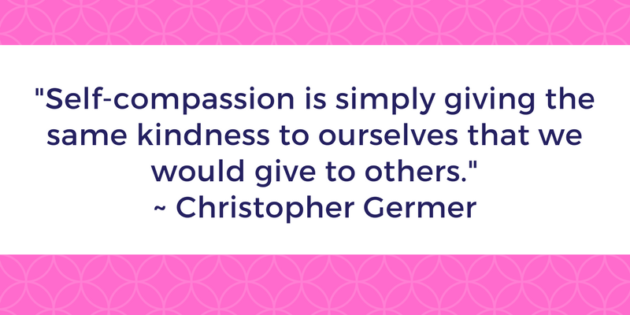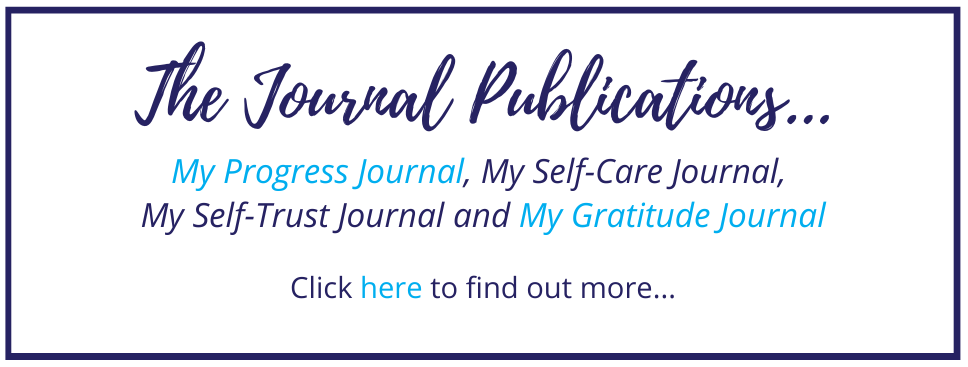Before sharing some of the Science of Self-Compassion, let’s make sure we are on the same page about self-compassion.
What is Self-Compassion?
Christopher Germer in his book The Mindful Path to Self-Compassion: Freeing Yourself from Destructive Thoughts and Emotions refers to self-compassion as “… simply giving the same kindness to ourselves that we would give to others.”
In her book Self-Compassion: The Proven Power of Being Kind to Yourself, Dr Kristin Neff refers to self compassion as having three components –
- Self-kindness – be gentle and understanding with ourselves rather than harshly critical and judgmental.
- Common humanity – feeling connected with others in the experience of life rather than feeling isolated and alienated by our suffering (i.e. experiencing our imperfections).
- Mindfulness – that we hold our experience in balanced awareness, rather than ignoring our pain and exaggerating it.
Also, in the The Force of Kindness, Sharon Salzberg wrote – “this kind of compulsive concern with “I, me and mine” isn’t the same as loving ourselves… Loving ourselves points us to capacities of resilience, compassion and understanding within that are simply part of being alive.”
The Science of Self-Compassion
Physiological Underpinnings (Gilbert, 2009)
The physiological underpinnings of self-criticism –
- Threat defence system, and
- Cortisol and adrenaline.
The physiological underpinnings of self-compassion –
- Mammalian care-giving system, and
- Oxytocin and opiates.
Research on Self-Compassion
There has been an explosion of research into self-compassion over the past decade –
- Most research has been conducted with the Self-Compassion Scale (Neff, 2003a).
Self-Compassion Linked to Wellbeing (Zessin, Dickhauser & Garbadee, 2015)
- Reductions in negative mind-states: anxiety, depression, stress, rumination, thought suppression, perfectionism, shame
- Increases in positive mind-states: life satisfaction, happiness, connectedness, self-confidence, optimism, curiosity, gratitude.
Self-Compassion vs. Self-Esteem (Neff & Vonk, 2009)
Self-compassion –
- Offers same wellbeing benefits without the pitfalls,
- Fewer social comparisons,
- Less contingent self-worth, and
- No association with narcissism (like self-esteem does).
Self-Compassion Linked to Coping and Resilience
- More effective coping with divorce (Sbarra et al., 2012)
- Less likely to develop PTSD after combat trauma (Hiraoka et al., 2015)
- Better coping with chronic health conditions (Sirois, 2015).
Self-Compassion Linked to Motivation
- Intrinsic motivation, desire to learn and grow (Neff, Hseih & Dejitthirat, 2005)
- Personal standards just as high, not as upset when don’t meet them (Neff, 2003a)
- Less fear of failure, more likely to try again and persist in efforts after failure (Breines & Chen, 2012).
Self-Compassion Linked to Personal Accountability
- More conscientiousness (Neff, Rude & Kirkpatrick, 2007)
- Taking greater responsibility for past mistakes (Leary et al., 2007)
- Disposition to apologize (Howell et al., 2011).
Self-Compassion Linked to Health
Healthier behaviours (Terry & Leary, 2011) –
- More exercise, safer sex, helps smokers quit, less alcohol use, more doctors’ visits
Linked to healthier body image and eating behaviour –
- Less body preoccupation and body shame (Albertson et al., 2014)
- Less likely to binge after blowing diet (Adams & Leary, 2007)
- Fewer weight worries, less disordered eating (Webb & Forman, 2013)
- More intuitive eating (Schoenefeld & Webb, 2013)
Self-Compassion Linked to Other-Focused Concern
- Linked to better romantic relationships (Neff & Beretvas, 2013)
– More caring and supportive relationship behaviour (as rated by partners)
– Less controlling and verbally aggressive
- More forgiveness and perspective taking (Neff & Pommier, 2013)
- More compassion, empathy, altruism for others (Neff & Pommier, 2013)
Self-Compassion for Caregivers
- Less burnout and “compassion” fatigue (Raab, 2014)
- More satisfaction with care-giving role (Barnard & Curry, 2012)
- Increased wellbeing for parents of autistic children (Neff & Faso, 2014)
Family Influences on Self-Compassion
- Attachment security (Wei, Liao, Ku & Shaffer, 2011)
- Parental criticism and conflict in home (Neff & McGehee, 2010)
- History of abuse (Vetesse et al., 2011).
Over to You…
If you are ready to reclaim your courage and take the next step towards freedom and opening your heart, why not join our Toolkit or click here to find out more about the 8-week Mindful Self-Compassion course or the 4-Week Untangling Self-Compassion course here.
If you don’t live on the Gold Coast, we can also support you to create self-compassion in our one-to-one-mentoring and coaching sessions. Click here to find out more.
References –
Albertson, E. R., Neff, K. D., & Dill-Shackleford, K. E. (2014). Self-compassion and body dissatisfaction in women: A randomized controlled trial of a brief meditation intervention. Mindfulness, 6(3), 444- 454.
Barnard, L. K., Curry, J. F. (2012). The relationship of clergy burnout to self-compassion and other personality dimensions. Pastoral Psychology, 61, 149–163.
Breines, J. G., & Chen, S. (2012). Self-compassion increases self-improvement motivation. Personality and Social Psychology Bulletin, 38(9), 1133-1143.
Germer, C. (2009). The Mindful Path to Self-Compassion: Freeing Yourself from Destructive Thoughts and Emotions. New York: Guilford Press.
Gilbert, P. (2009). The compassionate mind. London: Constable. Gilbert, P. (2010). An introduction to compassion focused therapy in cognitive behavior therapy. International Journal of Cognitive Therapy, 3(2), 97-112.
Hiraoka, R., Meyer, E.C., Kimbrel, N. A., B. DeBeer, B. B., Gulliver, S. B., & Morissette. S. B. (2015). Self-compassion as a prospective predictor of PTSD symptom severity among trauma-exposed U.S. Iraq and Afghanistan war veterans. Journal of Traumatic Stress, 28, 1-7.
Howell, A. J., Dopko, R. L., Turowski, J. B., & Buro, K. (2011). The disposition to apologize. Personality and Individual Differences, 51(4), 509-514.
Keng, S., Smoski, M. J., Robins, C. J., Ekblad, A. G., & Brantley, J. G. (2012). Mechanisms of change in mindfulness-based stress reduction: Self-compassion and mindfulness as mediators of intervention outcomes. Journal Of Cognitive Psychotherapy, 26(3), 270-280.
Leary, M. R., Tate, E. B., Adams, C. E., Allen, A. B., & Hancock, J. (2007). Self-compassion and reactions to unpleasant self-relevant events: The implications of treating oneself kindly. Journal of Personality and Social Psychology, 92, 887-904.
Neff, K. D. (2003a). Development and validation of a scale to measure self-compassion. Self and Identity, 2, 223-250.
Neff, K. D. (2003b). Self-compassion: An alternative conceptualization of a healthy attitude toward oneself. Self and Identity, 2, 85-102.
Neff, K. (2011). Self-Compassion: The Proven Power of Being Kind to Yourself. New York, USA: HarperCollins Publishers.
Neff, K. D., & Beretvas, S. N. (2013). The role of self-compassion in romantic relationships. Self and Identity, 12(1), 78-98.
Neff, K. D., & Faso, D. J. (2014). Self-Compassion and Well-Being in Parents of Children with Autism. Mindfulness, 1-10.
Neff, K. D., Hseih, Y., & Dejitthirat, K. (2005). Self-compassion, achievement goals, and coping with academic failure. Self and Identity, 4, 263-287.
Neff, K. D. & McGehee, P. (2010). Self-compassion and psychological resilience among adolescents and young adults. Self and Identity, 9, 225-240
Neff, K. D. & Pommier, E. (2013). The relationship between self-compassion and other-focused concern among college undergraduates, community adults, and practicing meditators. Self and Identity, 12(2),160-176
Neff, K. D., & Rude, S. S., & Kirkpatrick, K. (2007). An examination of self-compassion in relation to positive psychological functioning and personality traits. Journal of Research in Personality, 41, 908-916.
Neff, K. D., & Vonk, R. (2009). Self-compassion versus global self-esteem: Two different ways of relating to oneself. Journal of Personality, 77, 23-50.
Raab, K. (2014). Mindfulness, Self-Compassion, and Empathy Among Health Care Professionals: A Review of the Literature. Journal of health care chaplaincy, 20(3), 95-108.
Sbarra, D. A., Smith, H. L. & Mehl, M. R. (2012). When leaving your Ex, love yourself: Observational ratings of self-compassion predict the course of emotional recovery following marital separation. Psychological Science. 23(3), 261–269.
Schoenefeld, S. J., & Webb, J. B. (2013). Self-compassion and intuitive eating in college women: Examining the contributions of distress tolerance and body image acceptance and action. Eating behaviours, 14(4), 493-496.
Sirois, F. M., Molnar, D. S., & Hirsch, J. K. (2015). Self-Compassion, Stress, and Coping in the Context of Chronic Illness. Self and Identity, 14(3), 334-347.
Terry, M. L., & Leary, M. R. (2011). Self-compassion, self-regulation, and health. Self and Identity, 10(3), 352-362.
Vettese, L. C., Dyer, C. E., Li W. L. & Wekerle, C. (2011). Does self-compassion mitigate the association between childhood maltreatment and later emotional regulation difficulties? A preliminary investigation. International Journal of Mental Health and Addiction, 9, 480-491.
Webb, J. B., & Forman, M. J. (2013). Evaluating the indirect effect of self-compassion on binge eating severity through cognitive–affective self-regulatory pathways. Eating Behaviors, 14(2), 224-228.
Wei, M., Liao, K., Ku, T., & Shaffer, P. A. (2011). Attachment, self-compassion, empathy, and subjective well-being among college students and community adults. Journal of Personality, 79, 191-221.
Zessin, U., Dickhäuser, O., & Garbade, S. (2015). The Relationship Between Self‐Compassion and Well‐Being: A Meta‐Analysis. Applied Psychology: Health and Well‐Being, 7(3), 340-364.

















Leave A Response